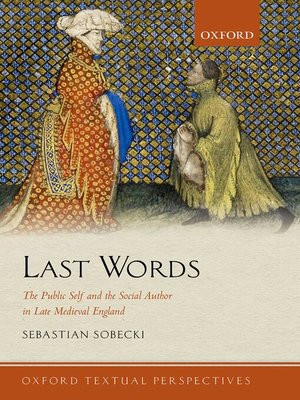Last Words
ebook ∣ The Public Self and the Social Author in Late Medieval England · Oxford Textual Perspectives
By Sebastian Sobecki

Sign up to save your library
With an OverDrive account, you can save your favorite libraries for at-a-glance information about availability. Find out more about OverDrive accounts.
Find this title in Libby, the library reading app by OverDrive.



Search for a digital library with this title
Title found at these libraries:
| Library Name | Distance |
|---|---|
| Loading... |
No medieval text was designed to be read hundreds of years later by an audience unfamiliar with its language, situation, and author. By ascribing to these texts intentional anonymity, we romanticise them and misjudge the social character of their authors. Instead, most medieval poems and manuscripts presuppose familiarity with their authorial or scribal maker. Last Words: The Public Self and the Social Author in Late Medieval England attempts to recover this familiarity and understand the literary motivation behind some of most important fifteenth-century texts and authors. Last Words captures the public selves of such social authors when they attempt to extract themselves from the context of a lived life. Driven by archival research and literary inquiry, this book reveals where John Gower kept the Trentham manuscript in his final years, how John Lydgate wished to be remembered, and why Thomas Hoccleve wrote his best-known work, the Series. It includes documentary breakthroughs and archival discoveries, and introduces a new life record for Hoccleve, identifies the author of a significant political poem, and reveals the handwriting of John Gower and George Ashby. Through its investments in archival study, book history, and literary criticism, Last Words charts the extent to which medieval English literature was shaped by the social selves of their authors.







